unit5一般现在时表将来专练
Unit 5 重点语法实义动词的一般现在时-七年级英语上册单元重难点易错题精练(人教版)
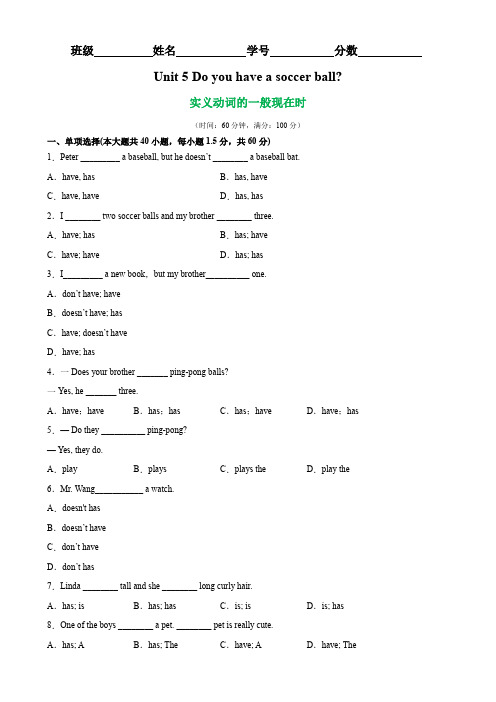
班级姓名学号分数Unit 5 Do you have a soccer ball?实义动词的一般现在时(时间:60分钟,满分:100分)一、单项选择(本大题共40小题,每小题1.5分,共60分)1.Peter _________ a baseball, but he doesn’t ________ a baseball bat.A.have, has B.has, haveC.have, have D.has, has2.I ________ two soccer balls and my brother ________ three.A.have; has B.has; haveC.have; have D.has; has3.I_________ a new book,but my brother__________ one.A.don’t have; haveB.doesn’t have; hasC.have; doesn’t haveD.have; has4.一Does your brother _______ ping-pong balls?一Yes, he _______ three.A.have;have B.has;has C.has;have D.have;has 5.— Do they __________ ping-pong?— Yes, they do.A.play B.plays C.plays the D.play the 6.Mr. Wang___________ a watch.A.doesn't hasB.doesn’t haveC.don’t haveD.don’t has7.Linda ________ tall and she ________ long curly hair.A.has; is B.has; has C.is; is D.is; has 8.One of the boys ________ a pet. ________ pet is really cute.A.has; A B.has; The C.have; A D.have; The9.—Does your brother__________ a ping-pong bat?—Yes, he__________.A.has; does B.have; has C.have; does D.has; have 10.—Does your brother ________ a tape player?—Yes,he ________ two.A.has;have B.have;have C.has;has D.have;has 11.The girl glasses is my friend.A.has B.with C.wears D.have 12.—your brother have soccer balls?—No, he. He has a basketball.A.Does; don’t B.Do; doesn’t C.Do; don’t D.Does; doesn’t 13.My brother ________ a soccer ball but I ________.A.have; don’t B.has; not C.have; not D.has; don’t 14.Mrs. Brown teaches ________ science. She ________ my mother to me.A.us, likes B.us, is like C.our, likes D.our, is like 15.— _______ you have soccer balls?—Yes, I do. And I have two baseballs.A.Does B.Are C.Do D.Can 16.—________ Lily have a nice and tidy room?—No,she ________.A.Do;don't B.Does;doesn'tC.Do;doesn't D.Does;don't17.My brother _______ have a baseball.A.don't B.doesn't C.isn't D.aren't 18.Tom ________ a big family. Now his family ________ at home.A.has; are eating B.has; is eating C.have; are eating D.have; is eating 19.Linda________ her homework but ________ on weekends.A.doesn’t do; watch TV B.doesn’t do; watches TV C.doesn’t; watch TV D.doesn’t; watches TV 20.—Jane, ________ your brother like oranges?—No, he only likes apples.A.is B.are C.do D.does21.—Does Potter like playing computer games?—No, he __________. He only likes reading books.A.isn’t B.don’tC.doesn’t D.didn’t22.—Do you have a ping-pong bat?—_________. But I have a ping-pong ball.A.Yes, I do B.No, I don’tC.Yes, I have D.No, I’m not23.Your English teacher_____tall and she_____curly hair.A.has; has B.is; is C.is; has D.has; is 24.He __________ soccer on Sunday afternoon. He __________TV.A.doesn’t play; watches B.don’t play; watches C.doesn’t play; watch 25.一Do you have a baseball bat?一_______ . But I have a ping-pong bat.A.Yes,I do B.No,I don't C.Yes,I have D.No,I haven't 26.My sister ________ tall and she ________ curly hair.A.is; is B.has; has C.has; is D.is; has 27.My mother ______ TV every day.A.watchs B.watch C.watches D.watchse 28.The girl ________ every Sunday.A.play sport B.plays sport C.play sports D.plays sports 29.Jenny ________ slim and she ________ long hair.A.is; is B.is; has C.has; has D.has; is 30.Bill two ping-pong balls?A.Do; have B.Does; haveC.Do; has D.Does; has31.My sister has a CD player but I_________.A.do B.doesC.don't D.doesn't32.—Does he play sports?—No, ______.He only watches them ______TV.A.he does, on B.he does, inC.he doesn’t, on D.he doesn’t, in33.—Does your brother ________ a tape player?—Yes, he ________ two.A.have; has B.has; has C.have; have D.has; have 34.—Does he have a baseball?—__________. But he has a baseball bat.A.Yes, he does B.Yes, he do C.No, he doesn’t D.No, he does 35.I ________ a soccer ball and my brother ________ a basketball.A.have, has B.have, have C.has, has D.has, have 36.—Does Bill ________ tennis bats?—Yes, he ________ two.A.have;have B.has;hasC.have;has D.has;have37.Does Tom ______ a brother?No,he ______.A.have;doesn't B.have;hasn'tC.has;doesn't D.has;hasn't38.My father ____________ many computer games.A.have B.has C.don't like D.like 39.Ms. Brown always ________ volleyball in the afternoon.A.play B.plays C.go D.goes 40.The children _______ a party last night. They were very happy.A.have B.has C.had D.were二、用所给单词的正确形式填空(本大题共10小题,每小题1分,共10分) 41.My sister __________(not have) a soccer ball.42.Bruce only __________(watch) sports on TV!43.Michael __________(have) a computer.44.Let’s _________(go) to play volleyball.45.Does your father _________(play) sports every day?46.Linda ________(not have)a soccer ball.47.________they________(like) the World Cup?48.She ________ (have) a computer game. It’s on her bed.49.My father often ______________to see my grandpa on Sundays. (go)50.I don’t have a ping-pong bat. But my sister ________ (do).三、句型转换(本大题共10小题,每小题3分,共30分)51.Sue has a soccer ball.(改为否定句)Sue _______ _______ a soccer ball.52.I have a computer.(改为一般疑问句并作肯定回答)—_______ _______ _______ a computer?—_______,_______ _______.53.I don't have a baseball. My brother has a baseball.(用but连接句子)I _______ _______ a baseball,_______ my brother _______.54.We play computer games.(改为以let's开头的祈使句)_______ _______ computer games.55.The nice watch is Lucy's.(改为同义句)_______ _______ a nice watch.56.I have a computer. (改为一般疑问句,并作肯定回答)________ ________ ________ a computer?________,________ ________.57.We have a soccer ball. (改为否定句)We ________ ________ a soccer ball.58.Sue has a small sports collection. (改为否定句)Sue _________ __________ a small sports collection.59.Ann has a brother. (改为一般疑问句)________ Ann ________ a brother?60.Do they like eggs? (作肯定回答)________, ________ ________.参考答案:1.B【详解】试题分析:句意:皮特有一个垒球,但是他却没有垒球棒。
人教版九年级英语unit5语法知识点
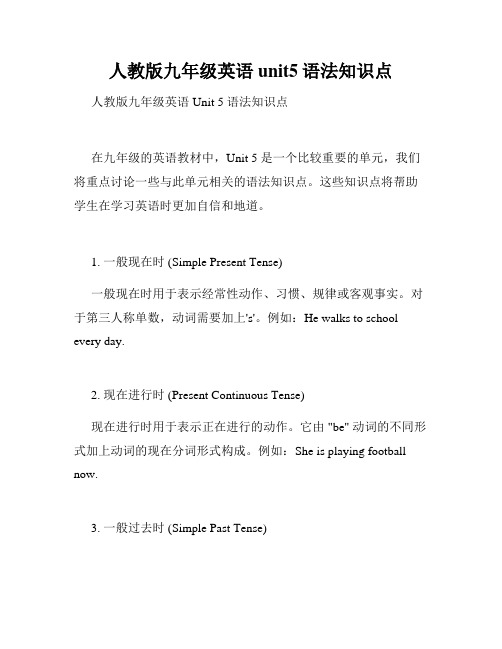
人教版九年级英语unit5语法知识点人教版九年级英语Unit 5 语法知识点在九年级的英语教材中,Unit 5 是一个比较重要的单元,我们将重点讨论一些与此单元相关的语法知识点。
这些知识点将帮助学生在学习英语时更加自信和地道。
1. 一般现在时 (Simple Present Tense)一般现在时用于表示经常性动作、习惯、规律或客观事实。
对于第三人称单数,动词需要加上's'。
例如:He walks to school every day.2. 现在进行时 (Present Continuous Tense)现在进行时用于表示正在进行的动作。
它由 "be" 动词的不同形式加上动词的现在分词形式构成。
例如:She is playing football now.3. 一般过去时 (Simple Past Tense)一般过去时用于表示过去某个特定的时间发生的动作或状态。
动词需要用过去式。
例如:I watched a movie last night.4. 过去进行时 (Past Continuous Tense)过去进行时表示过去某一时刻正在进行的动作或状态。
它由"was/were" 动词的不同形式加上动词的现在分词形式构成。
例如:They were studying when I called.5. 一般将来时 (Simple Future Tense)一般将来时用于表示将来某个时间将要发生的动作或状态。
通常使用 "will" 或 "be going to" 加上动词原形来构成。
例如:Wewill have a meeting next week.6. 现在完成时 (Present Perfect Tense)现在完成时用于表示过去某个时间开始并一直延续到现在的动作或状态。
它由"have/has" 加上动词的过去分词形式构成。
2014九年级Unit5_What_are_the_shirts_made_of练习包含被动语态专练
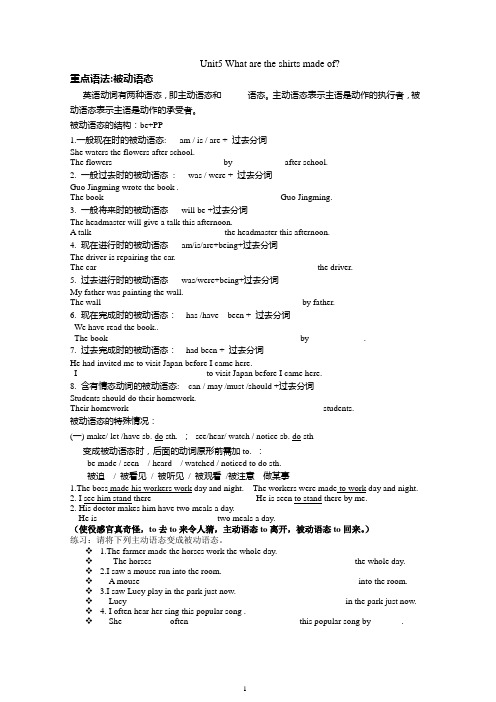
Unit5 What are the shirts made of?重点语法:被动语态英语动词有两种语态,即主动语态和______语态。
主动语态表示主语是动作的执行者,被动语态表示主语是动作的承受者。
被动语态的结构:be+PP1.一般现在时的被动语态: am / is / are + 过去分词She waters the flowers after school.The flowers ___________ ____________by ___________ after school.2. 一般过去时的被动语态: was / were + 过去分词Guo Jingming wrote the book .The book ____________ ____________ ____________Guo Jingming.3. 一般将来时的被动语态will be +过去分词The headmaster will give a talk this afternoon.A talk ______ ______ _______ _____the headmaster this afternoon.4. 现在进行时的被动语态am/is/are+being+过去分词The driver is repairing the car.The car ____________ ___________ ___________ __________the driver.5. 过去进行时的被动语态was/were+being+过去分词My father was painting the wall.The wall ______________ ______________ _____________ by father.6. 现在完成时的被动语态:has /have been + 过去分词We have read the book..The book ______________ ____________ _____________ by ____________.7. 过去完成时的被动语态:had been + 过去分词He had invited me to visit Japan before I came here.I _______ _________ _________to visit Japan before I came here.8. 含有情态动词的被动语态: can / may /must /should +过去分词Students should do their homework.Their homework __________ _________ __________ _________students.被动语态的特殊情况:(一) make/ let /have sb. do sth. ;see/hear/ watch / notice sb. do sth变成被动语态时,后面的动词原形前需加to. :be made / seen / heard / watched / noticed to do sth.被迫/ 被看见/ 被听见/ 被观看/被注意做某事1.The boss made his workers work day and night. The workers were made to work day and night.2. I see him stand there He is seen to stand there by me.2. His doctor makes him have two meals a day.---He is _______ _______ _______ two meals a day.(使役感官真奇怪,to去to来令人猜,主动语态to离开,被动语态to回来。
初中英语人教九年级Unit 5语法:一般现在时的被动语态及各种时态的被动语态练习题(含答案)

人教九年级Unit 5 一般现在时的被动语态及各种时态被动语态的练习题一基本结构:be+动词的过去分词* 一般现在:am/is/are+doneMany people speak English.=English_is ____ _spoken____ by many people.注意:时间状语从句和条件状语从句应用一般现在时的被动语态—Are you going to Sam’s birthday party the day after tomorrow? (invite)—I’m not sure. I will go with you if I _____.are sentExercises:二单项选择:1. Nowadays China ____ for its new “four great inventions”—shared bicycle, electronic payment, high-speed railways and online shopping.A. was knowingB. was knownC. is knowingD. is known2. —Can you go to the movies with me tonight?—I have to ask my mum. If I , I will go with you.A. allowB. allowedC. am allowedD. was allowed3. —Your hometown is beautiful, and the air is really fresh.—Yes. Many trees and flowers ______ around here every year.A. plantB. are plantedC. was plantedD. will plant4. The latest mobile phone _______ in China.A. will makeB. has madeC. is makingD. is made5. We Chinese ________ by the touching documentary Amazing China.A. encourageB. encouragesC. are encouragedD. are encouraging6. — People,especially the young, by their friends.—That’ s true.Friends play an important part in everyone’ s life.A. easily influences B.is easily influencedC. are easily influenced D.influenced easily7. Chinese _______ by more and more people around the world.A. is spokenB. speakC. speaking8. Too much time______ on computer games by most teenagers every day. And their parents are worried about their health and study.A. spendsB. is spentC. has spentD. spending9. FIFA World Cup ________ every four years. Guess which team will win next?A. is heldB. was heldC. will be held10. Look at the picture. The top five TV plays _______ in it.A. listB. are listedC. will listD. will be listed11. Our classroom by students every afternoon.A. is cleanedB. was cleanedC. cleans12. Kids have to take many after-school classes. They _____ hard to study for good grades.A. pushB. are pushedC. are pushingD. have pushed13. The weatherman says a rain shower ______ this afternoon in the south.A. expectsB. expectedC. is expectedD. was expected14. Dr Bethune ____________ still_________ in both China and Canada today.A. is; rememberedB. is rememberingC. will; rememberD. has; remembered15. Many modern trains in the world _____ in Zhuzhou.A. are creatingB. createdC. are created二.真题链接16. (2019湖南株洲) The students in this school ______ to choose their own school uniforms.A. are allowedB. allowedC. are allowing17. (2019 四川达州)—Dr. Bethune helped a lot of Chinese in the 1930s, he is a great international soldier.—I know, so he ____ still ____ in both China and Canada now.A. has; rememberedB. is; rememberedC. will; rememberD. is; remembering18. (2019 辽宁辽阳)—Your classroom looks so clean and tidy.—Yes, it ______ every day.A. cleansB. is cleanedC. cleanedD. was cleaned19. (2019辽宁铁岭) The Chinese traditional poems _______to spread by popular singers.A. is singingB. are singingC. is sungD. are sung20. (2019云南曲靖) Pu’er Tea ________ in some western areas of Yunnan.A. plantsB. was plantedC. is plantingD. is planted21. (2019 广西贵港)—Do you know the famous artist in red?—Sure. He _______ to the art festival in our city every year.A. invitesB. invitedC. is invitedD. was invited 三.句型转换。
仁爱七下unit5练习题
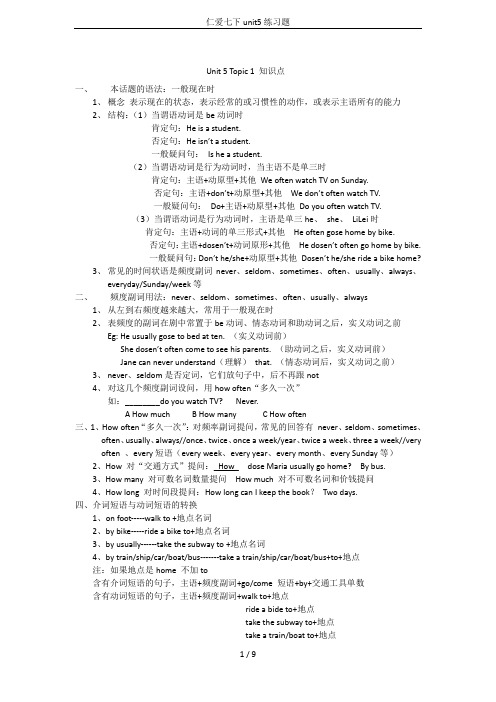
Unit 5 Topic 1 知识点一、本话题的语法:一般现在时1、概念表示现在的状态,表示经常的或习惯性的动作,或表示主语所有的能力2、结构:(1)当谓语动词是be动词时肯定句:He is a student.否定句:He isn’t a student.一般疑问句:Is he a student.(2)当谓语动词是行为动词时,当主语不是单三时肯定句:主语+动原型+其他We often watch TV on Sunday.否定句:主语+don’t+动原型+其他We don’t often watch TV.一般疑问句:Do+主语+动原型+其他Do you often watch TV.(3)当谓语动词是行为动词时,主语是单三he、she、LiLei时肯定句:主语+动词的单三形式+其他He often gose home by bike.否定句:主语+dosen’t+动词原形+其他He dosen’t often go home by bike.一般疑问句:Don’t he/she+动原型+其他Dosen’t he/she ride a bike home?3、常见的时间状语是频度副词never、seldom、sometimes、often、usually、always、everyday/Sunday/week等二、频度副词用法:never、seldom、sometimes、often、usually、always1、从左到右频度越来越大,常用于一般现在时2、表频度的副词在剧中常置于be动词、情态动词和助动词之后,实义动词之前Eg: He usually gose to bed at ten. (实义动词前)She dosen’t often come to see his parents. (助动词之后,实义动词前)Jane can never understand(理解)that. (情态动词后,实义动词之前)3、never、seldom是否定词,它们放句子中,后不再跟not4、对这几个频度副词设问,用how often“多久一次”如:________do you watch TV? Never.A How muchB How manyC How often三、1、How often“多久一次”:对频率副词提问,常见的回答有never、seldom、sometimes、often、usually、always//once、twice、once a week/year、twice a week、three a week//very often 、every短语(every week、every year、every month、every Sunday等)2、How 对“交通方式”提问:_How_ dose Maria usually go home? By bus.3、How many 对可数名词数量提问How much 对不可数名词和价钱提问4、How long 对时间段提问:How long can I keep the book?Two days.四、介词短语与动词短语的转换1、on foot-----walk to +地点名词2、by bike-----ride a bike to+地点名词3、by usually------take the subway to +地点名词4、by train/ship/car/boat/bus-------take a train/ship/car/boat/bus+to+地点注:如果地点是home 不加to含有介词短语的句子,主语+频度副词+go/come 短语+by+交通工具单数含有动词短语的句子,主语+频度副词+walk to+地点ride a bide to+地点take the subway to+地点take a train/boat to+地点注:地点是home时,前边不加to五、1、“by+交通工具单数”,用how提问,by后不能加a/an 也不能加to the、one’s、this、that等限定词,即什么也不加2、“by+交通工具单数”可以用“in/on + a/an+交通工具”转换,还放句末。
九年级Unit 5 一般现在时被动语态讲与练

九年级英语人教版Unit 5 一般现在时被动语态讲与练一、概念被动语态表示主语是动作的承受者。
后用by+动作的执行者(有时可省略)。
一般说来,及物动词才有被动语态。
汉语意为"被"。
如:He speaks English.他说英语。
(主动语态)English is spoken by him.英语被他说。
(被动语态)二、一般现在时被动语态的构成1. 肯定:由“助动词am/is/are+及物动词的过去分词"构成。
如:I am known by them.我被他们了解。
The classroom is cleaned every day. 教室每天被打扫。
Trees are planted every year.树每年被种。
2. 否定:由“助动词am/is/are + not + 及物动词的过去分词"构成。
如:I am not invited by her. 我没有被她邀请。
Chinese isn’t spoken by him. 他不说汉语。
(汉语没有被他说。
)You aren’t chosen by them. 你没有被他们选到。
3. 一般疑问句:Am/Is/Are+主语(+ not)+ 及物动词的过去分词。
如:Am I gotten the first place in the race? 在比赛中我跑到了第一吗?Is the work finished by him? 他完成了工作吗?Are all the books put into the room? 所有的书都放进房间吗?练习巩固:一、选择题( )1. Cotton ____ in the southeast of China.A. is grownB. are grownC. growsD. grow( )2. The Great Wall ____ all over the world.A. knowsB. knewC. is knownD. was known( )3. A knife _______ cut things, like apples, water melons.A. is used toB. is used forC. used toD. use to( )4. Rice ___ also _____ in their hometown.A. is…grownB. is…grewC. was…grewD. was…grown( )5. This English song _____ often _____ by the children.A. is, singingB. is, sungC. will, singD. was, sung( )6. Dr Bethune ________ still________ in both China and Canada today.A. is; rememberedB. is; rememberingC. will; rememberD. has; remembered( )7. Our classroom is very clean and tidy because it ______ every day.A. cleansB. cleanedC. was cleanedD. is cleaned( )8. Nowadays, because of the Readers(《朗读者》)by CCTV, many book fans _____ reading in public places.A. will seeB. were seenC. are seenD. have seen( )9. The latest mobile phone _____ in China.A. will makeB. has madeC. is makingD. is made( )10. Look at the picture. The top five TV plays ________ in it.A. listB. are listedC. will listD. will be listed( )11. FIFA World Cup______every four years. Guess which team will win in 2020 Russia FIFA World Cup?A. is heldB. was heldC. will be held二、句型转换1. We plant trees every spring. (改被动语态)Trees ______ ______ by _____ every spring.2. Is tea grown in South China?(改为主动语态)_______ people _________ tea in South China?3. I am given a birthday present by my parents every year.(同义句转换)A birthday present _______ _______ _______ _______by my parents every year.4. People use metal for making machines. (改为被动语态)Metal ________ _________ _______making machines.5. We call the game “Lianliankan”. (改为被动语态)The game _______ ________ “Lianliankan” by us.三、中考真题练( )1. -Why does the earth look blue in space?-Because most of the earth's surface ______ by water. (2020•黄石)A. coversB. is coveredC. coverD. are covered( )2. When you go abroad, you'll find that so many products in local shops_____ in China.(2020•菏泽)A. makeB. have madeC. are made( )3. --As China grows stronger and stronger,Chinese _____ in more and more schools out of our country.--That's true. As a Chinese,I feel very proud. (2020•鄂州)A .teaches B. has taught C. is taught D. was taught( )4. If a driver______ to park in the wrong place, he'll get a fine.(2020•漳州)A. findsB. is foundC. has found( )5. --These days,teenagers often have to do what they __ __to.--It's not good for their independence. They need to think on their own.(2020•厦门)A. tellB. are tellingC. are told( )6. A year has four seasons and it ______ twelve months. (2020•十堰)A. divided intoB. is dividing intoC. was divided intoD. is divided into ( )7. In Switzerland,things like glass and plastic_______ into different groups and then recycled.(2020•盐城)A. separateB. separatedC. are separatedD. is separated( )8. Chinese ______ by more and more people around the world. (2020•南充)A. is spokenB. spokeC. are spokenD. speaks( )9. Every year many trees _____along the streets to make our city more beautiful.(2020•泸州)A. plantB. have plantedC. are plantedD. were planted( )10. Chinese New Year ________ the Spring Festival.People often eat dumplings. (2020•长春)A.is called B.was called C.calls D.called参考答案一、选择题1-5. ACAAB 6-11.ADCDB A二、句型转换1. are planted; us2. Do; grow3. is given to me4. is used for5. is called三、中考真题练1-5. BCCBC 6-10. DCACA。
Unit 5 语法思维导图及专练-2024-2025学年七年级英语上册基础知识专项讲练(人教版)

Unit 5 Do you have a soccer ball?(语法讲练)【知识导图】【要点拓展】1.have意为“有”。
一般现在时的句子中,当主语是第三人称单数时,谓语动词用has;当主语是第一、二人称成第三人称复数时,谓语动词用have。
Jim has three rulers.古姆有三把尺子。
We have two English teachers我们有两位英语老师。
2.含有实义动词have的句子变否定句或一般疑问句时,需要借助助动词do或dos.(1)否定句结构是:主语+do not/don’t (does not/doesn’t) + have+其他①主语是第一、二人称成第三人称复数时,句中实义动词have前需要加don’t或do not。
● I have a basketball.我有一个蓝球。
→I don’t /do not have a basketball.我没有篮球。
①主语是第三人称单数时,句中实义动词has前需要加doesn’t或does not,并将第三人称单数形式has变为have。
She has a good memory.她的记性很好。
→She doesn’t /does not have a good memory.她的记性不好。
(2)一般疑问句结构是:Do/Does +主语+have+其他?①主语是第一、二人称或第三人称复数时,句中主语前需要加do。
You have some pets.你有一些宠物。
→Do you have any pets?你有什么宠物吗?①主语是第三人称单数时,句中主语前需要加does并将第三人称单数形式has变为have。
He has a volleyball.他有一个排球。
→Does he have a volleyball?他有排球吗?①一般疑问句的答语肯定回答:Yes ,主语+do/does.否定回答:No ,主语+don’t/doesn’t. —Do you have a good friend?有好朋友吗? —Yes, I do.是的,我有。
译林-六年级下册Unit5-考点精练.doc
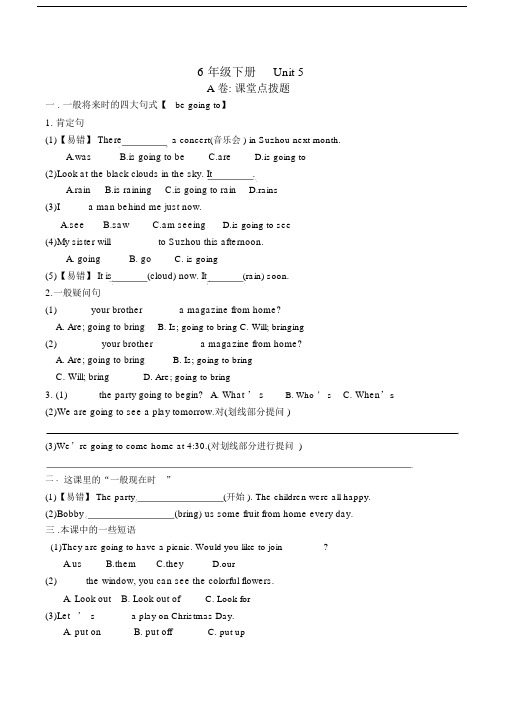
6 年级下册Unit 5A 卷: 课堂点拨题一 . 一般将来时的四大句式【be going to】1. 肯定句(1)【易错】 There a concert(音乐会 ) in Suzhou next month.A.wasB.is going to beC.areD.is going to(2)Look at the black clouds in the sky. It.A.rainB.is rainingC.is going to rainD.rains(3)I_____ a man behind me just now.A.seeB.sawC.am seeingD.is going to see(4)My sister will ________ to Suzhou this afternoon.A. goingB. goC. is going(5)【易错】 It is(cloud) now. It(rain) soon.2.一般疑问句(1)______ your brother ______ a magazine from home?A. Are; going to bringB. Is; going to bringC. Will; bringing(2)________ your brother ________ a magazine from home?A. Are; going to bringB. Is; going to bringC. Will; bringD. Are; going to bring3. (1)______the party going to begin? A. What ’ s B. Who ’ s C. When’s (2)We are going to see a play tomorrow.对(划线部分提问 )(3)We’re going to come home at 4:30.(对划线部分进行提问 )二 . 这课里的“一般现在时”(1)【易错】 The party(2)Bobby(开始 ). The children were all happy. (bring) us some fruit from home every day.三 .本课中的一些短语(1)They are going to have a picnic. Would you like to join________?B.themC.theyD.our(2)_____ the window, you can see the colorful flowers.A. Look outB. Look out ofC. Look for(3)Let’ s ______ a play on Christmas Day.A. put onB. put offC. put up(4)We must ______ the bikes and cars.A. look out ofB. look out forC. look atD. watchB 卷: 课后巩固题一 .选择( )1.【易错】 It ’s too late. I_____ home.A.goB.am going toC.am going to goD.went( )2.My dad ________ Beijing next month.A. will going toB. is going toC. want to go( )3.【易错】 It ’s a nice day. Let’s ______ a picnic this afternoon.A. going to haveB. havingC. have( )4.【易错】 There ________ a ball game next week.A.will haveB.will hasC. is going to be( )5.______ you ______ basketball tomorrow afternoon?A. Do; playB. Are; playC. Are; going to playD. Will; playing( )6.【易错】 He a clown for the party.A.is going toB. going to beC. is going to be( )7.What are you going to do the party ?A.inB.onC.at( )8.Children's Day is June.A.onB.inC.at二.填入适当的词1.tell (过去式 ) 6.gift( 同义词 )2.angry (副词 ) 7.end(反义词 )3.safely (名词 ) 8.begin(现在分词 )4.early(反义词 ) 9.bring(反义词 )5.happy (副词 ) 10.invite(ing 形式 )11.My father (go) to Shanghai tomorrow afternoon.12.Wang Bing (buy) some fruit from the supermarket soon.13.【易错】 Tomorrow is (child) Day.14.【易错】 From then on, the lost cat never (出现).15.【易错】 He suddenly (出现 ) in front of us that day. 三.翻译1.朝外看2.一个西方聚会3.到达太早8.上演一出戏4.晚几分钟9.to be a clown5.在儿童节10.an invitation6.举行派对11.做国王7.从家里带些水果12.他没有打算住那座小屋。
人教新目标版九年级英语上册 Unit 5 达标测试卷(含详细解答)

人教新目标版九年级英语上册Unit 5 达标测试卷(限时: 60分钟满分: 100分)班级:姓名:得分:一、单项选择(每小题1 分, 共10 分)1. — Could you please help me to look for my lost dog? ________ name is Gina.—Of course.A. ItB. It’sC. ItsD. Its’2. — What do you know about Xiangyang?—It’s ________its state level scenic spot(景点)—Gulongzhong.A. famous asB. different fromC. similar toD. known for3. It took them several weeks ________the task.A. completeB. completelyC. to completeD. completed4. You are not supposed to go to a family party unless you ________to in the US.A. are not invitedB. are invitedC. will be invitedD. invited5. How terrible! The truck hit the wall to avoid ________the child.A. hurtB. to hurtC. hurtsD. hurting6. Mr. Wang has a way of making his class________.A. liveB. aliveC. livelyD. living7. It is said that this kind of cloth is made ________ silk and it is made ________ China.A. from; fromB. of; onC. of; inD. with; from8. I find ________hard for me ________so much homework in such a short time.A. it; finishingB. it’s; finishC. it; to finishD. that; to finish9. It snowed heavily last night and the ground was ________snow this morning.A. filled withB. covered withC. used forD. asked for10. If you want to improve your________English, you should practice it ________.A. everyday;every dayB. every day;everydayC. everyday;everydayD. every day;every day二、完形填空(每小题1.5 分, 共15 分)The lion dance is part of traditional Chinese culture. People often perform it the night before the Chinese New Year. They ________11perform it for other happy occasions. People think the lion dance can ________12 good luck and success.There are many different stories ________13 how the lion dance began. One of them is like this: Hundreds of years ago, a monster called Nian came to a village in China. The villagers were ________14. A lion chased Nian away. A year later, Nian came back again, but this time the lion couldn’t ________15. So the villagers made a “lion”by themselves. Their “lion”danced, jumped and chased Nian away. For this ________16, people began to perform the lion dance before the Spring Festival to chase bad luck away.There are ________17 different kinds of lion dances. In the southern lion dance, the dancers ________18 hard to perform like a real lion. Their “lion” may shake its body. The dance can be funny. The ________19 kind is the northern lion dance. It has more martial art skills like rolling, leaping and jumping. Both kinds are very interesting to watch, but it takes a lot of ________20 to perform well.11. A. still B. also C. almost D. just12. A. bring B. leave C. find D. keep13. A. in B. with C. about D. over14. A. excited B. bored C. relaxed D. scared15. A. help B. agree C. visit D. refuse16. A. story B. reason C. event D. mistake17. A. two B. three C. four D. five18. A. watch B. fight C. catch D. try19. A. other B. same C. only D. simple20. A. luck B. advice C. practice D. hope三、<荣德原创> 阅读理解(每小题3 分, 共15 分)How small is this book? It is 5.7 cm high and 4.7 cm wide. An English child Charlotte Brontë made the mini book. The book starts with the alphabet (字母表) and ends with books about animals, flowers, birds, games, outdoor activities and a very short history of England. Charlotte’s first work was to write a short story for her baby sister Anne. “I need such a school book to help her learn about the world,”said Charlotte. She was only 12 when she finished it.Now the British Library encourages people to start writing and making mini books like Charlotte. The British Library is the national library of the UK and one of the largest libraries in the world. It started National Mini Book Project earlier this month. A full activity guide is now o n the library’s website, offering ideas and advice for making a book that is 57 mm high and 47 mm wide(around as long as a mouse’s tail). Children across the country took part in it by making their own mini books.“The project can give children something fun and help them to be imaginative. They are books for a doll,” a library worker said.The history of tiny books goes back much further. In around 1800, John Marshall created The Infant’s Library, a set of tiny books designed for children to read to their dolls. Each was no bigger than a matchbox.21. Charlotte Brontë wrote the first story for ________.A. her friendsB. her toysC. her parentsD. her little sister22. What is National Mini Book Project?A. It calls on British kids to make mini books.B. It encourages British kids to read mini books.C. It advises British kids to raise money for mini books.D. It asks British parents to buy mini books for their kids.23. How does the British Library help the kids to make mini books?A. The library puts an activity guide on its website.B. The library offers money for making a mini book.C. The library sets up a new library to show mini books.D. The library is trying to build more libraries for kids to read mini books.24. What does the underlined word “imaginative” mean in Chinese?A. 有用的B. 有技能的C. 富有想象力的D. 健康的25. Which of the following is TRUE according to the passage?A. Charlotte Brontë is a character in a mini book.B. Making mini books in the UK has a long history.C. The British Library is the library only for British kids.D. John Marshall created The Infant’s Library 1,800 years ago.四、词汇运用(每小题1 分, 共10 分)A) 根据句意及首字母或汉语提示写单词。
一般现在时一般过去时一般将来时现在完成时综合练习
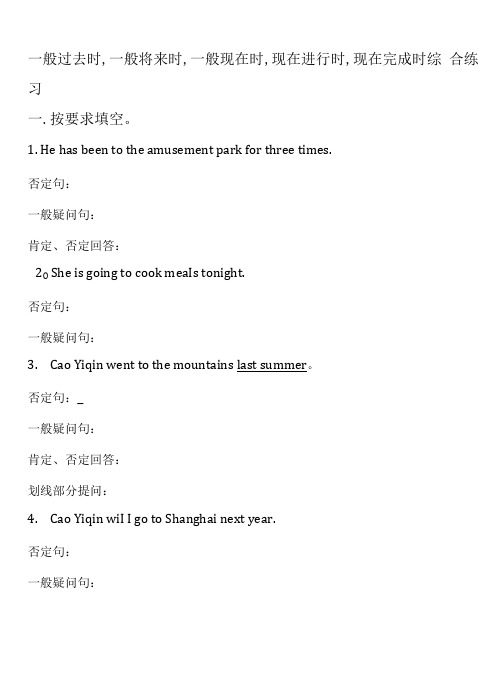
一般过去时,一般将来时,一般现在时,现在进行时,现在完成时综合练习一.按要求填空。
1. He has been to the amusement park for three times.否定句:一般疑问句:肯定、否定回答:2O She is going to cook meaIs tonight.否定句:一般疑问句:3.Cao Yiqin went to the mountains last summer。
否定句:_一般疑问句:肯定、否定回答:划线部分提问:4.Cao Yiqin wiI I go to Shanghai next year.否定句:一般疑问句:肯定、否定回答:(word完整版)一般现在时—一般过去时—一般将来时—现在完成时综合练习5O I often pI ay footbaI I o否定句:一般疑问句:肯定、否定回答:6. Cao Yiqin often goes to bed at 10:30 at night o否定句:一般疑问句:肯定、否定回答:7O写出下列动词的现在分词、过去式和过去分词.buy cut dr i nk eat fa I Ifee I _____________________________________f i ght f i nd get give go hearI earn I ose meetpay readrun ______________ ________________ ________________say send s i t s I eep stand sw i mteach te I Ith i nk 二.选择题。
1. How Iong has Eliza been a nurse?Ao Sinee 2002. B. Four years ago。
C. In 2002.2.----- May I speak to Tom? -------------- S orry, he is not at home. Heto Shangha i. Ao has been B o has gone Co goes3.-How was your weekend on the farm? 一Great! We with the farmers oAo enjoy ourseIves B. went fishing C. wi I I work Do make fr i ends 4.——you ever to the Un i ted States?(word完整版)一般现在时—一般过去时—一般将来时—现在完成时综合练习一Yes, twice.A. Have: goneB. Have: beenC. Do: goD. Were: going5O They have been i n th i s city three years ago oAo for B. about Co s i nee60 - have you been I earn i ng Eng Ii sh?—I have been I earn i ng Eng Ii sh for s i x years oAo How Iong B. How often Co How far7.一Where i s Zhang Mi ng? ------ Oh, he to Bei jng and he wi I Ibe back tomorrow0A. has beenB. has goneC. goes8.The Greens supper now. A: is having B:are; havingC: is haveing9.you usuaI Iy to schooI with cI assmates ?A. Do, comesB. does, comeC. Do, come1Oo Mr Green usually newspapers after supper every day.A. readB. read i ngC. reads11.He I en(wash ) c I othes? Yes , she i s . Ao Is, washing B. Does , wash Co Is,washes12. There a dolphin show in the zoo tomorrow evening.A. wasB. is going to have Q wi I I have D o is go i ng to be 13. He her a beaut i fuI hat on her next b i rthday.A. givesB. gaveC. will giving D o is going to giving 14o There a meeting tomorrow afternoon.A. wi I I be going to B o wi I I going to be Co is going to be D. will go to be 三.填空题.1.我母亲通常在星期日打扫卫生、洗衣服。
人教版英语九年级全一册Unit5【刷语法】一般现在时的被动语态(重点语法提升练)单元测试必刷题含答案

2022-2023学年九年级英语全一册单元模块满分必刷题(人教版)Unit 5【刷语法】(重点语法提升练)一般现在时的被动语态什么是被动语态?英语动词有两种语态,主动语态和被动语态。
主动语态的主语是动作的执行者;被动语态的主语是动作的承受者,理解为“被……” 。
不同时态的被动语态:被动语态的结构是“be+过去分词”,be动词有时态、人称和数的变化。
当不知道动作的执行者或没必要指出动作的执行者,只强调突出动作的承受者时,用被动语态。
一般现在时的被动语态:1.肯定结构:am / is / are+过去分词;否定结构:am not / isn’t / aren’t+过去分词;一般疑问句把am / is / are放到句首。
如:The toy is made in China.这玩具由中国制造。
I am not allowed to drive, because I’m not old enough.我不被允许开车,因为我年龄不够。
Are you told to start at once? 你们被告知立刻开始吗?一、单项选择1.(2022·辽宁丹东·中考真题)—Do Chinese people like ping-pong a lot?—Yes. It _______ by people of all ages.A.plays B.is played C.played D.was played 2.(2022·湖南益阳·中考真题)—Students in our school ________ to swim in the rivers or lakes alone.—Neither are we. After all, safety must come first.A.allow B.don’t allow C.aren’t allowed3.(2022·辽宁大连·中考真题)In the Wolong Panda Reserve, visitors ________ to get closer to pandas. A.allow B.allowed C.are allowing D.are allowed 4.(2022·广西·中考真题)Chinese _________ by more and more people in the world.A.speak B.speaks C.is speaking D.is spoken5.(2022·广西贵港·中考真题)— People ________ to take their temperatures before they go into the supermarket during the COVID-19 pandemic (新冠疫情).— I think it’s a good way to protect ourselves.A.are asking B.are asked C.asked D.ask6.(2022·北京·中考真题)On our farm, the tea leaves ________ by hand when they are ready.A.pick B.picked C.are picked D.were picked 7.(2022·黑龙江绥化·中考真题)Chinese astronauts ________ as heroes. We all look up to them. A.are regarded B.regard C.regarded8.(2022·贵州铜仁·中考真题)—Mum, could I watch the movie The Battle at Changjin Lake tonight?—Of course, if your homework ______.A.finishes B.finished C.was finished D.is finished 9.(2022·四川·凉山彝族自治州教育科学研究所中考真题)With double reduction policy (双减政策), students ________ less homework now so that they have enough time to take part in more activities. A.will give B.were given C.are given10.(2022·湖北湖北·中考真题)—Many DIY cards ________ to mothers on Mother’s Day every year.—How creative!A.is sending B.are sending C.is sent D.are sent11.(2022·河北·中考真题)—Mmm…Delicious. What is it?—It ________ zongzi, Tony. It’s a traditional food in China.A.calls B.is called C.called D.was called 12.(2022·四川·乐山市教育科学研究所中考真题)—Waiter, a glass of apple juice, please.—Sorry. Apple juice ________ only at breakfast.A.serves B.is served C.is serving13.(2022·天津·中考真题)A lot of birds ________ in nature parks every year.A.protect B.is protected C.are protected D.protected 14.(2022·云南昆明·中考真题)The tea in Yunnan is so famous that it ________ to places across the world every day.A.sends B.sent C.is sent D.will be sent 15.(2022·四川遂宁·中考真题)—More and more high-technology products ________ in China.—Yes. Our country is becoming stronger and stronger.A.is making B.are making C.is made D.are made 16.(2022·辽宁阜新·中考真题)Chinese ________ by more and more people around the world today. A.learns B.learned C.was learned D.is learned 17.(2022·江苏·盐城市盐都区实验初中一模)—It’s so tiring to wash clothes by hand. When can we use the washing machine?—Not until it ________ tomorrow.A.repairs B.will repair C.is repaired D.will be repaired 18.(2022·广西贵港·二模)—How does your father help you in your life?—When things aren’t going well, I ________ not to give up by him.A.encourage B.encouraged C.am encouraged D.will encourage 19.(2022·江苏宿迁·三模)Now more and more people ________ to do voluntary work for their communities.A.have encouraged B.are encouraging C.were encouraged D.are encouraged 20.(2022·内蒙古兴安盟·一模)What a nice garden! It ________ every day!A.is cleaning B.has cleaned C.must clean D.is cleaned二、用所给单词的正确形式填空21.(2022·江苏泰州·二模)Wang Xiaoxue’s story tells us that nothing will be difficult if more attention ________ (pay) to them.22.(2022·江苏省锡山高级中学实验学校三模)What a mess! Those shared-bikes ________ (throw) all around. Let’s put them in the right place.23.(2022·江苏省锡山高级中学实验学校三模)New York is often ________ (mistake) for the capital city of America.24.(2022·贵州安顺·二模)In Chinese culture, tigers are ________(regard)as a symbol of power, energy and protection.25.(2022·甘肃·一模)The Hong Kong-Zhuhai-Macao Bridge is ________ (consider) as a wonder. 26.(2022·江苏泰州·二模)— When will we go out to buy some vegetables?— Dear, as soon as my work _________ (do).27.(2022·江苏无锡·二模)In the swimming club, only members ________(allow)to take showers. 28.(2022·江苏·兴化市教师发展中心二模)I will feel very honored if I ________ (choose) to be our team leader.29.(2022·江苏无锡·中考真题)You ________ (expect) to be more organized in high school. So you can keep a diary.30.(2022·江苏泰州·中考真题)Jiangsu automatic(自动化) test of listening and speaking _______ (hold) in April every year.31.(2019·西藏·中考真题)Every year many trees ________ (plant) along the streets to make our city more beautiful.32.(2017·黑龙江大庆·中考真题)In England, afternoon tea is often ________ (drink) as a light meal. 33.(2017·江苏无锡·中考真题)These brightly colored bicycles can be seen everywhere. They ________(lock)by the user after riding, and then unlocked by the next rider with a mobile phone. 34.(2018·湖北鄂州·中考真题)Every baby ________ as the apple of the parents’ eye. (regard) 35.(2018·江苏泰州·中考真题)Taizhou and Changzhou ________ (separate) by the Yangtze River, and a new bridge will connect the two cities in the near future.36.(2021·江苏无锡·中考真题)The beans of this kind ________ (sell) in only a few coffee shops in Shanghai at present.三、完成句子37.(2022·湖北恩施·中考真题)据说从下学期开始,煮饭会成为小学生的一项必备技能。
(完整版)一般将来时、一般现在时、一般过去时、正在进行时练习题
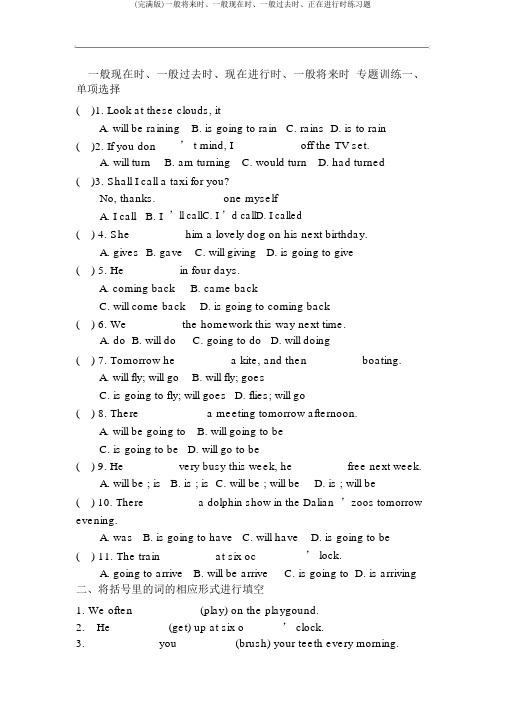
一般现在时、一般过去时、现在进行时、一般将来时专题训练一、单项选择()1. Look at these clouds, it _______________A. will be rainingB. is going to rainC. rainsD. is to rain()2. If you don’ t mind, I __________ off the TV set.A. will turnB. am turningC. would turnD. had turned()3. Shall I call a taxi for you?No, thanks. __________ one myselfA. I callB. I’ll callC. I ’d callD. I called() 4. She ________ him a lovely dog on his next birthday.A. givesB. gaveC. will givingD. is going to give() 5. He ________ in four days.A. coming backB. came backC. will come backD. is going to coming back() 6. We ________ the homework this way next time.A. doB. will doC. going to doD. will doing() 7. Tomorrow he ________ a kite, and then ________ boating.A. will fly; will goB. will fly; goesC. is going to fly; will goesD. flies; will go() 8. There __________ a meeting tomorrow afternoon.A. will be going toB. will going to beC. is going to beD. will go to be() 9. He ________ very busy this week, he ________ free next week.A. will be ; isB. is ; isC. will be ; will beD. is ; will be() 10. There ________ a dolphin show in the Dalian ’zoos tomorrow evening.A. wasB. is going to haveC. will haveD. is going to be() 11. The train ________ at six oc’ lock.A. going to arriveB. will be arriveC. is going toD. is arriving二、将括号里的词的相应形式进行填空1. We often___________(play) on the playgound.2.He _________(get) up at six o’ clock.3.__________you _________(brush) your teeth every morning.4.What(do) he usually (do) after school?5.Danny(study) English, Chinese, Maths, Science and Art at school.6.Mike sometimes __________(go) to the park with his sister.7.At eight at night, she ________(watch) TV with his parents.8.________ Mike________(read) English every day?9.How many lessons ______your classmate____(have) on Monday?10.What time ____his mother_________(do) the housework?11.Don ’ t make a noise. Grandpa __________(sleep).12.It ________(take) me two hours to finish my homework last night.13.-What ______ your mother _______(do) every evening?-She _______(wash) clothes.14._______ it ______ (rain)every day?15.There ________ (be) a football match on TV every morning.16. they often ________ (visit) the Great Wall.17. The earth __________ (move) round the sun.三、写出以下动词的第三人称单数形式:1.wash_________ match _______guess______ study______ finish_________ go________ snow______ carry_________2.stop______ see________ drive ________let_______ carry______ keep_____ join______ find_______ think________teach______ catch______3.stay_______ begin______ forget_______lie________die _______ run_______prefer______give________ring_______dance______ hope_______四、写出以下动词的过去式tell break build catch begin draweat come buy cut read putthink go get give keep know改句子1. Do you often play football after school? (必定答复 )2. I have many books. 〔改为否认句〕3.Gao Shan’ s sister likes playing table tennis〔改为否认句〕4.She lives in a small town near New York. 〔改为一般疑问句〕5.I watch TV every day. 〔改为一般疑问句〕6.David has a goal. 〔改为一般疑问句〕7.We have four lessons〔.否认句〕8.Nancy doesn ’ t run fast〔必定句〕9.My dog runs fast. (一般疑问句 )10.Su Yang usually washes some clothes on Saturday〔划.线提问〕11.Su Yang usually washes some clothes on Saturday〔.划线提问〕12.Mingming usually waters the flowers every day。
牛津译林英语六年级下册U5-8课堂易错练习
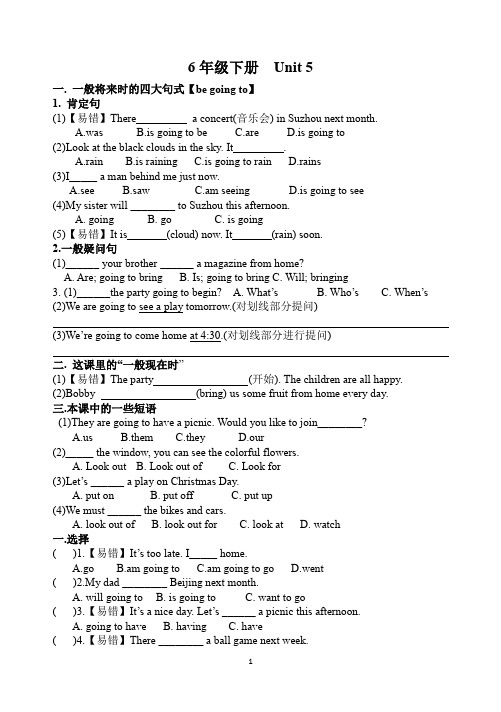
6年级下册Unit 5一. 一般将来时的四大句式【be going to】1. 肯定句(1)【易错】There a concert(音乐会) in Suzhou next month.A.wasB.is going to beC.areD.is going to(2)Look at the black clouds in the sky. It .A.rainB.is rainingC.is going to rainD.rains(3)I_____ a man behind me just now.A.seeB.sawC.am seeingD.is going to see(4)My sister will ________ to Suzhou this afternoon.A. goingB. goC. is going(5)【易错】It is (cloud) now. It (rain) soon.2.一般疑问句(1)______ your brother ______ a magazine from home?A. Are; going to bringB. Is; going to bringC. Will; bringing3. (1)______the party going to begin? A. What’s B. Who’s C. When’s(2)We are going to see a play tomorrow.(对划线部分提问)(3)We’re going to come home at 4:30.(对划线部分进行提问)二. 这课里的“一般现在时”(1)【易错】The party (开始). The children are all happy.(2)Bobby (bring) us some fruit from home every day.三.本课中的一些短语(1)They are going to have a picnic. Would you like to join________?B.themC.theyD.our(2)_____ the window, you can see the colorful flowers.A. Look outB. Look out ofC. Look for(3)Let’s ______ a play on Christmas Day.A. put onB. put offC. put up(4)We must ______ the bikes and cars.A. look out ofB. look out forC. look atD. watch一.选择( )1.【易错】It’s too late. I_____ home.A.goB.am going toC.am going to goD.went( )2.My dad ________ Beijing next month.A. will going toB. is going toC. want to go( )3.【易错】It’s a nice day. Let’s ______ a picnic this afternoon.A. going to haveB. havingC. have( )4.【易错】There ________ a ball game next week.A.will haveB.will hasC. is going to be( )5.______ you ______ basketball tomorrow afternoon?A. Do; playB. Are; playC. Are; going to playD. Will; playing ( )6.【易错】He a clown for the party.A.is going toB. going to beC. is going to be( )7.What are you going to do the party?A.inB.onC.at( )8.Children's Day is June.A.onB.inC.at9.【易错】Tomorrow is (child) Day.10.【易错】From then on, the lost cat never (出现).11.【易错】He suddenly (出现) in front of us that day. ( )1.David is talking______his plans for the weekend.A.withB.toC.forD.about( )2.--Would you like to go to the theatre with me?--______A.Yes, I like.B.Yes, I’d love to.C.No, I can’t.D.Yes, you can. ( )3.【易错】Just then, the rain _____.A. stoppedB. is stoppingC. stopsD. is going to stop( )4.【易错】It’s ______ Tuesday morning. Yang Ling doesn’t ______ to school.A. on; goB. /; goesC. on; goesD. /; go( )5.You can be ______ minutes late for the parents’ meeting.A. a fewB. a littleC. fewD. little( )6.Tim’s mother angry because Tim homework yesterday.A. is, isn’t doingB. did, didn’t doC. was, didn’t do( )7.Mr. Smith swimming every weekends. But he do it last week.A. goes; didn’tB. goes; doesn’tC. went; didn’t( )8.【易错】Mr Green usually ______to his friends when he was young.A. writesB. is writingC. wrote( )9.--What’s the weather like in the UK? -- It’s often ____.A. rainingB. rainyC. rains( )10.What_________ beautiful flowers!A. aB. /C. the( )11.Be , please. You shouldn’t talk______ in the library.A. quiet, loudB. quietly, loudlyC. quiet, loudly( )12.【易错】It is going to be May Day _____ next Monday.A.onB.inC./( )13.--Is that Gao Shan?--_________.A. Yes, I amB. No, I am notC. Yes, speakingD. Yes, that is( )14.You can use a pen _____ words.A. writeB. to writeC.writes二.填词1.Here (be) some water for you.2.【易错】Let’s have some fun (one).3.【易错】(Do) anybody know why we have snow?4.To keep (健康), you must exercise every day.5.【易错】Sandy wants (be) a teacher.6.The (happy) girl danced ( happy).7.【易错】There (be) two glasses of juice in the cup just now.8.Mike read some books and ( watch) TV.9.Tom is going to go (climb) with his friends this Saturday.10.【易错】Su Hai, ( not put) your hands on the desk.11.Suddenly(突然) a clown (appear) at the party.12.April is (four) month(月)of a year.13.They will buy (they) parents some presents.14.What they (do) last night?15.What they (do) tomorrow night?16.【易错】Would you love (join) us?17.【易错】Shall we (clean) the classroom now?6B Unit 6一.will 一般将来时的四大句式1.肯定句(1)We will a film and a picnic tonight.A. watch, haveB. watched, hadC. watch, hadD. watched, have(2)【易错】I think that the weather hot this summer.A. will beB. isC. becomeD. be(3)There a football game tomorrow afternoon.A. wasB. will beC. is going to haveD. will have(4)【易错】Let (we) (play) basketball this afternoon.2.否定句(1)We (not fly) kites next weekend.(2)I 'll come with my uncle this afternoon.(改为否定句)3. 一般疑问句(1)Will you ____fish ___me? Yes, I ____.A. cooking, to, willB. cook, for, doC. cook, for, will(2)Are you going ____________(play) the piano?(3) they (watch) the World Cup tomorrow?4. 特殊疑问句(1)--What Helen ? --She’s writing an email.A.is, going to doB. will, doC. are, doingD. is, doing(2)I'll ask my e-friend in Australia.(对划线部分提问)ask?(3)They’re going to come home at 4:30.(对划线部分进行提问)are to come home?二. visit 和visitor(1)每年许多观光客参观澳大利亚。
Unit5+一般现在时的被动语态练习 人教版九年级英语全册+

九年级Unit5 语法练习题一.根据要求改写句子。
1. I wash dishes every day. (改被动语态)2.Most of the farm work is done by machines in China.(改主动语态)3.He takes good care of the child.(改被动语态)4.Parents usually don’t allow their child to swim alone in the river.(改被动语态)5.French and English are spoken in Canada. (改一般疑问句)6.The jacket is made of cotton.(改否定句)7.Lily doesn’t invite me to join in her birthday day. (改被动语态)8.People celebrate the Mid-Autumn Festival on the 15th of the eighth lunar month every year. (改被动语态)9.My mother waters her flowers twice a week. (改被动语态)10.The car is made in Shanghai. (对划线部分进行提问)二.有关被动语态的常考词组*辨析:be made of / be made from / be made into / be made by / be made inbe made by被.......制成后接制作人、生产商,强调制作人是谁be made of由......制成后接原材料,从成品中能看出原材料be made from由......制成后接原材料,从成品中不能看出原材料be made into被制作成为......后接制作而成的成品be made in在......制造,产于某地后接地点、场所,强调生产地* 辨析:be known for / be known as / be known tobe known for以(因为)......而闻名、著名for 后接出名的原因= be famous for be known as作为......而出名、闻名后接表示身份、职位的名词= be famous as be known to为某人所熟知后接表示出名的范围= be famous to1.Tu Youyou, a woman scientist from China, is ________ ___________ winning the Nobel Prize in 2015.2.Hong Kong _________________ its shopping streets.3.HongKong __________________ a shopping city.4.HongKong ___________________ people all over the world.三.选择题。
[译林版]5B一般现在时与将来进行时区别及练习
![[译林版]5B一般现在时与将来进行时区别及练习](https://img.taocdn.com/s3/m/fa9d5567bf23482fb4daa58da0116c175f0e1ed3.png)
[译林版]5B一般现在时与将来进行时区别及练习一般现在时和将来进行时是英语中常用的两种时态,它们在用法上有一些区别。
本文将介绍这两种时态的基本用法,并提供相应的练。
一般现在时一般现在时表示目前的状态或经常性的动作。
以下是一般现在时的基本用法:1. 表示客观事实或自然规律:- The sun rises in the east.(太阳从东方升起。
)- Water boils at 100 degrees Celsius.(水在100摄氏度沸腾。
)2. 表示经常性的动作或惯:- I brush my teeth twice a day.(我每天刷两次牙。
)- They go to the gym every Saturday.(他们每个星期六去健身房。
)3. 表示现阶段的情况或状态:- She works as a teacher.(她目前是一名教师。
)- We live in a big city.(我们住在一个大城市。
)将来进行时将来进行时表示将来某一时刻正在进行的动作。
以下是将来进行时的基本用法:1. 表示预定或安排:- I will be studying at the library tomorrow afternoon.(明天下午我将在图书馆研究。
)- They will be having dinner at a fancy restaurant later.(他们一会儿将在一家豪华餐厅吃晚饭。
)2. 表示对未来的打算或意图:- She will be traveling to Europe next summer.(明年夏天她将去欧洲旅行。
)- We will be attending a conference next week.(下周我们将参加一次会议。
)3. 表示对未来发生的事情的推测或预测:- They will be arriving late tonight.(他们今晚将会迟到。
一般现在时表将来的练习题
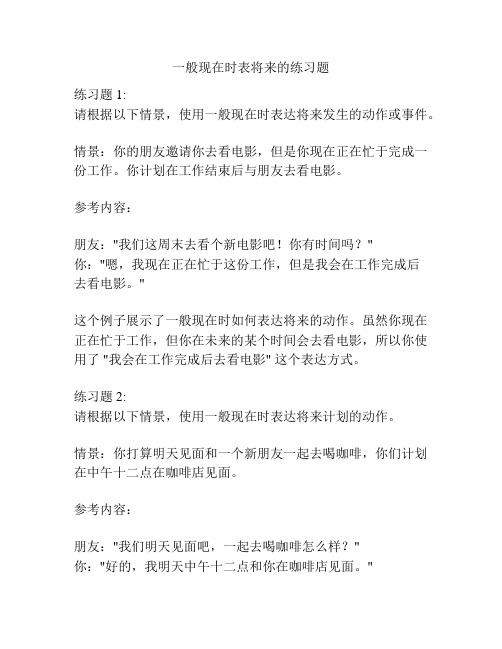
一般现在时表将来的练习题练习题 1:请根据以下情景,使用一般现在时表达将来发生的动作或事件。
情景:你的朋友邀请你去看电影,但是你现在正在忙于完成一份工作。
你计划在工作结束后与朋友去看电影。
参考内容:朋友:"我们这周末去看个新电影吧!你有时间吗?" 你:"嗯,我现在正在忙于这份工作,但是我会在工作完成后去看电影。
"这个例子展示了一般现在时如何表达将来的动作。
虽然你现在正在忙于工作,但你在未来的某个时间会去看电影,所以你使用了 "我会在工作完成后去看电影" 这个表达方式。
练习题 2:请根据以下情景,使用一般现在时表达将来计划的动作。
情景:你打算明天见面和一个新朋友一起去喝咖啡,你们计划在中午十二点在咖啡店见面。
参考内容:朋友:"我们明天见面吧,一起去喝咖啡怎么样?"你:"好的,我明天中午十二点和你在咖啡店见面。
"在这个例子中,你使用了一般现在时来表达将来的计划动作。
虽然明天才会发生,但你已经做出了计划,并用 "我明天中午十二点和你在咖啡店见面" 这个表达方式来明确说明你的计划。
练习题 3:请根据以下情景,使用一般现在时表达将来经常或定期发生的动作。
情景:你的朋友请你帮忙每个星期日晚上遛狗,你同意了,并告诉他你每个星期日晚上都有时间。
参考内容:朋友:"你能每个星期日晚上帮我遛狗吗?"你:"当然可以!我每个星期日晚上都有时间可以帮你遛狗。
"在这个例子中,你使用了一般现在时来表达将来经常或定期发生的动作。
尽管每个星期日晚上都会发生,你使用 "我每个星期日晚上都有时间可以帮你遛狗" 这个表达方式来表示你的可靠性和愿意帮忙的态度。
练习题 4:请根据以下情景,使用一般现在时表达将来的信息和时间安排。
情景:你的朋友邀请你参加她的生日派对,但你想知道派对将在何时和何地举行。
牛津上海版九年级英语上册Unit5知识点归纳及练习
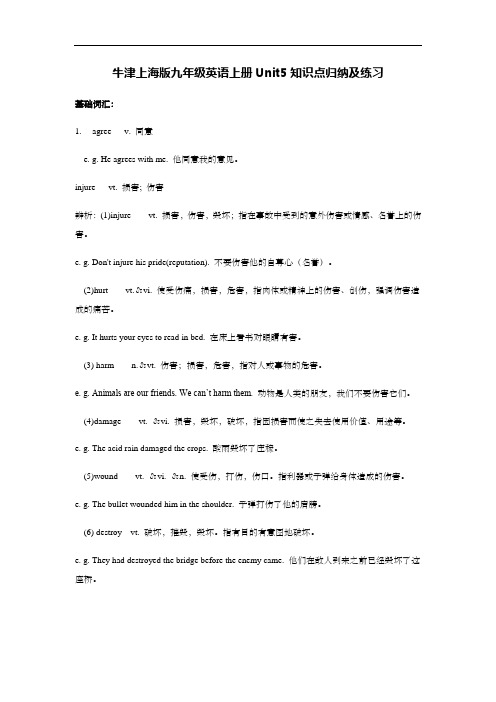
牛津上海版九年级英语上册Unit5知识点归纳及练习基础词汇:1.agree v. 同意e. g. He agrees with me. 他同意我的意见。
injure vt. 损害; 伤害辨析:(1)injure vt. 损害,伤害,毁坏;指在事故中受到的意外伤害或情感、名誉上的伤害。
e. g. Don't injure his pride(reputation). 不要伤害他的自尊心(名誉)。
(2)hurt vt.&vi. 使受伤痛,损害,危害,指肉体或精神上的伤害、创伤,强调伤害造成的痛苦。
e. g. It hurts your eyes to read in bed. 在床上看书对眼睛有害。
(3) harm n.&vt. 伤害;损害,危害,指对人或事物的危害。
e. g. Animals are our friends. We can’t harm them. 动物是人类的朋友,我们不要伤害它们。
(4)damage vt. &vi. 损害,毁坏,破坏,指因损害而使之失去使用价值、用途等。
e. g. The acid rain damaged the crops. 酸雨毁坏了庄稼。
(5)wound vt. &vi. &n. 使受伤,打伤,伤口。
指利器或子弹给身体造成的伤害。
e. g. The bullet wounded him in the shoulder. 子弹打伤了他的肩膀。
(6) destroy vt. 破坏,摧毁,毁坏。
指有目的有意图地破坏。
e. g. They had destroyed the bridge before the enemy came. 他们在敌人到来之前已经毁坏了这座桥。
3. afterward adv. 然后,后来地e. g. We saw the film and afterwards walked home together. 我们看了电影后一起走回了家。
- 1、下载文档前请自行甄别文档内容的完整性,平台不提供额外的编辑、内容补充、找答案等附加服务。
- 2、"仅部分预览"的文档,不可在线预览部分如存在完整性等问题,可反馈申请退款(可完整预览的文档不适用该条件!)。
- 3、如文档侵犯您的权益,请联系客服反馈,我们会尽快为您处理(人工客服工作时间:9:00-18:30)。
Unit5一般现在时表将来专练姓名时态体现在谓动上1.一般现在时+S(一般)谓动+S形(主:三单) +es(以s,x,ch,sh,o结尾) do原(其余人称) yi+es(以辅音字母加y结尾)2.一般过去式+d(以不发音的e结尾)谓动:过去式规则:+ed +ed(一般)不规则yi+ed(以辅音字母加y结尾))双尾+ed(两辅夹一元的重读闭音节)3.现在进行时直接加(一般)谓动:is\am\are+doing 去e加(以不发音的e结尾)双尾加(两辅夹一元的重读闭音节)4.过去进行时谓动:was\were +doing用法:①过去某一时刻正在发生的动作②过去某一段时间内一直在做某事表过去某一时刻的标志:at eight yesterday morning, at this time yesterday, when the teacher came in, at that time, just then, at the same timeyesterday表过去某一段时间的标志:from 8:00 pm to 10:00 pm yesterday afternoon, when\while my mother was cooking5.一般将来时谓动:is\am\are going towill\shall +do原6.过去将来时谓动:was\were going toWould +do原7.现在完成时谓动:have\has +done8.过去完成时谓动:had+ done 谓动9. 一般现在时的被动语态is\am\are+done10. 一般过去时的被动语态was\were+done11.变一般疑问句规律①把be、情、助提到主语前②在主语前加do ,does ,did , 谓语还原12.变否定句规律①在be、情、助后加not②在主语后加don’t,doesn’t,didn’t,谓语还原13.对划线部分提问规律:先将划线部分变成特殊疑问词,再将剩余部分变成一般疑问句。
①主谓I’m thinking.②主谓宾I have a book.③主系表That sounds good. I’m a boy.④主谓+间宾+直宾She told me a true story⑤主谓宾+宾补I find him a good boy.14.由when before\after\not...until\as soon as①引导的时间状语从句:一般将来时要换成一般现在时②引导宾语从句:一般将来时还用一般将来时(什么时候)由if,unless=if…not,as long as①引导的条件状语从句:一般将来时要换成一般现在时②引导宾语从句:一般将来时还用一般将来时(是否=whether)总之:一般将来时主句含情态动词,从句:一般现在时祈使句15.when ①当…时候+时间状语从句+短语(作介词,后接名词或动名词)与用法①相同的还有before, after, while②什么时候+宾语从句作特殊疑问词+to doEg:1. Please take off your shoes when you (enter) someone’s house.2.Please take off your shoes when (enter) someone’s house.3.Do you know when the train (leave)?4.I don’t know when (leave).5.After (walk) for a long time, hefelt very tired.6.If I run every day, I (be) healthier.7.If it (not rain),he (play) with me tomorrow.8.She must see a dentist if she (have)a toothache.9.Study hard, or you (not pass) the test.10. If you (not go) to bed earlier, you will tired in the morning.11.Take a bus , or we’ll be late.(改同义句)we take a bus, we’ll be late.12.I (not have) a partyif I (not pass) my exam. 13.If I become a teacher, I (be) able to work with children.14.If it (not rain)tomorrow,I (visit) my uncle.15.There (be) no difficulties if you put your heart into it.16.If he (come) to see me tomorrow , I’ll be happy.17.He (be)a doctor when he (grow)up.18.-Please tell me when he (come) back. When he (come) back, I’ll meet him at the station.19. I’ll tell them the news as soon asthey (come) back.20. They won’t go to the Great Wall ifit (rain) tomorrow.21.If my parents (be) free tomorrow, we (go) for picnic.22.Could you tell me when the dinner party (begin)?23.--Do you know when he (come) back?--Sorry, I don’t know. Whenhe (come) I’ll tell you. 24. If you (take) away the mobile phone, other (think) you are thief.25. I don’t know if Linda (come).I think she if she (be) free. 26. Our class (climb) the hill if it (not rain) tomorrow.27.Do you know if we (go) to the cinema tomorrow, I think we(not go) if we (have) too much homework.28.He (become) famous when he was twenty.选择题1.What if you don’t work hard at your lessons?A. happensB. happenC. will happenD. happened2.Don’t play with fire, you may burn yourself.A. orB. \C. andD. but3.Betty will ring me up when shein Beijing.A. arriveB. arrivesC. arrivedD. will arrive4.---Tom wants to know if you will have a picnic tomorrow.---Yes. But if it ,we’ll play chess instead.A. will rainB. rainedC. is rainingD. rains5.If you sports for a living, your job will sometimes be dangerous.A playsB will playC are playingD play6.If there no buying and selling of animals, there no killing in nature.A is; will beB will be; will beC is; isD will be; is7.The sense of happiness will increase if you what you like to do.A. doB. didC. will do8.I’ll do better if the teacher me another chance.A. giveB. gives C gave D. will give9.-- I think I’m going to watch TV at home. ----If you , you’ll miss that great match.A. areB. doC. canD. will10.—I like flying all over the world.---I think a tour guide is just for you.A. isB. wasC. beD. being11. The children will go to the park if ittomorrow.A. isn’t snowingB. won’t snowC. doesn’t snowD. didn’t snow12.My mother unhappy if I play computer games too often.A. will isB. will beC. isD. was13. If she there this week, I you up.A. will go; will callB. goes; callC. will go; callD. goes; will call14. Y ou’ll learn a lot you travel around China.A. soB. thatC. ifD. because15.—Shall we go on a picnic this weekend? ----That sounds a great idea, if it . A.rains B. doesn’t rainC. will rainD. won’t rain16.Hurry up, you will be late for class.A. andB. orC. butD. so17.I don’t know he will come to my party tonight. he comes, I’ll tell you.A. if; whetherB. whether; IfC. if thatD. that if18. I don’t know the day after tomorrow.A.when does he comeB.how will he comeC.if he comesD.whether he’ll come。
